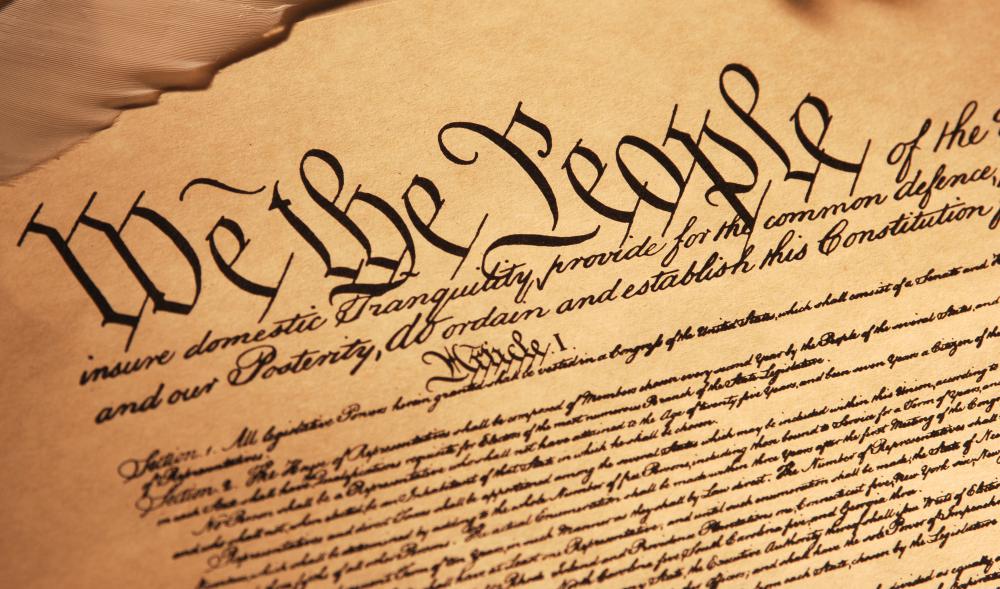At WiseGEEK, we're committed to delivering accurate, trustworthy information. Our expert-authored content is rigorously fact-checked and sourced from credible authorities. Discover how we uphold the highest standards in providing you with reliable knowledge.
What are the Primary Theories of Constitutional Interpretation?
Theories of constitutional interpretation in the United States are varied and complex, but most fall into one of several major categories. Judges charged with deciding constitutional issues may subscribe to a number of different theories including originalism, textualism, intentionalism, contextualism, constructionism, pragmatism, non-interpretivism and dynamic evolution. Fortunately, many of these interpretations are somewhat related to each other, making them slightly easier to understand and group together.
For example, those who take an originalism approach believe that the U.S. Constitution should be interpreted as close to its original meaning as possible. This is very close to constructionism, which calls for a literal interpretation of every word of the constitution. These are considered very conservative judicial philosophies.

Also considered a conservative philosophy when considering theories of constitutional interpretation is textualism. This is similar to constructionism, but instead of taking the constitutional literally, judges may search the text for contextual tools. For example, while the Constitution notes that "Congress shall make no law" restricting speech, other contextual clues in the document, such as prohibitions against treason, would reasonably show, in the textualist's viewpoint, that not all speech is protected.

Intentionalism seeks to determine what the writers of the original Constitution, or the writers of amendments to that Constitution, originally intended when they wrote it. Judges who follow this theory believe the writers' intentions can be determined through context, historical articles, or looking at the situation the lawmakers were dealing with at the time. In this way, the statute can be interpreted to what the writers originally had in mind.
Other theories are a little more progressive in their viewpoint. Pragmatism, dynamic evolution, and the natural law theory are just some of those viewpoints. Though each have elements that are the same, they are also different in some key ways.

The pragmatist and those who believe in dynamic evolution believe the Constitution should be interpreted in the context of other decisions. This is often called judicial precedence. In such cases, other judges have set a pattern that is meant to be followed. Dynamic evolution is similar in that it may consider alternative theories of constitutional interpretation, but it may or may not put as much weight on judicial precedence.
Those who believe in the natural theory believe that all laws humans create should conform to a natural, or moral, law from a higher power. Under this theory, the U.S. Constitution must be interpreted in a way that agrees with that higher law. Natural law theorists may be considered more conservative or liberal, depending on what their interpretations are of that higher, moral law.
Similar to natural law is non-interpretivism. Those who follow this theory believe outside sources should be used in interpreting the Constitution. In some cases, those outside sources may become more important than the words in the Constitution itself. This can be quite controversial, depending on the outside source used to form decisions and the end result of those decisions.
AS FEATURED ON:
AS FEATURED ON:













Discussion Comments
Mutsy - Well a federal judge just ruled that the health care bill is unconstitutional based on the commerce clause of the constitution. This will likely go to the Supreme Court and will be decided there. I am glad that he saw what the other 27 states saw as a violation of the constitution.
I agree that judges should respect the constitution and not try to create legislation based on their rulings.
But not all judges follow the constitution. For example, in California, the voters voted against Gay Marriage which was called Prop 8 yet it was overturned by the ninth circuit court of appeals in San Francisco.
This was a measure already approved by the voters so I think that the vote should be respected and not overturned like that.
I have to say that with respect to the laws nothing is more important than our constitution. I feel that there should a strict interpretation to the constitution.
Judges that participate in judicial activism are legislating from the bench and that is unacceptable. If the constitution is not respected then nothing will.
Post your comments